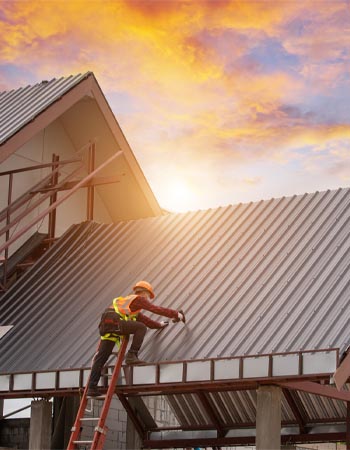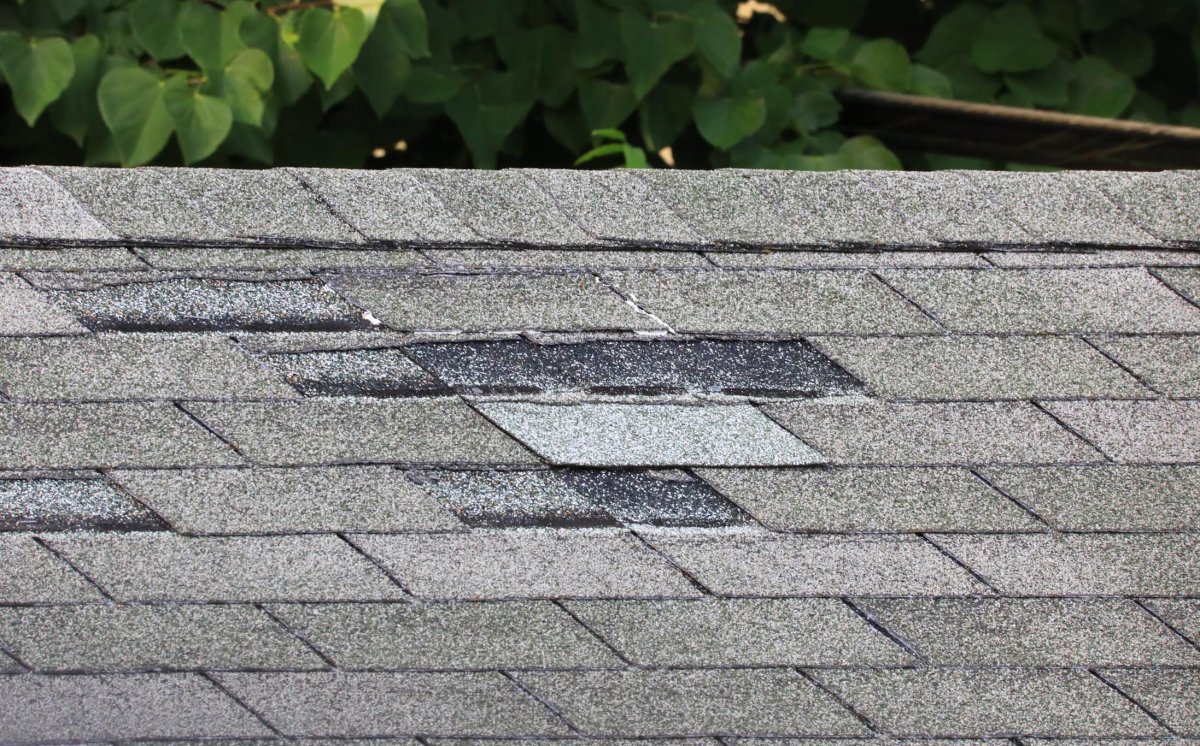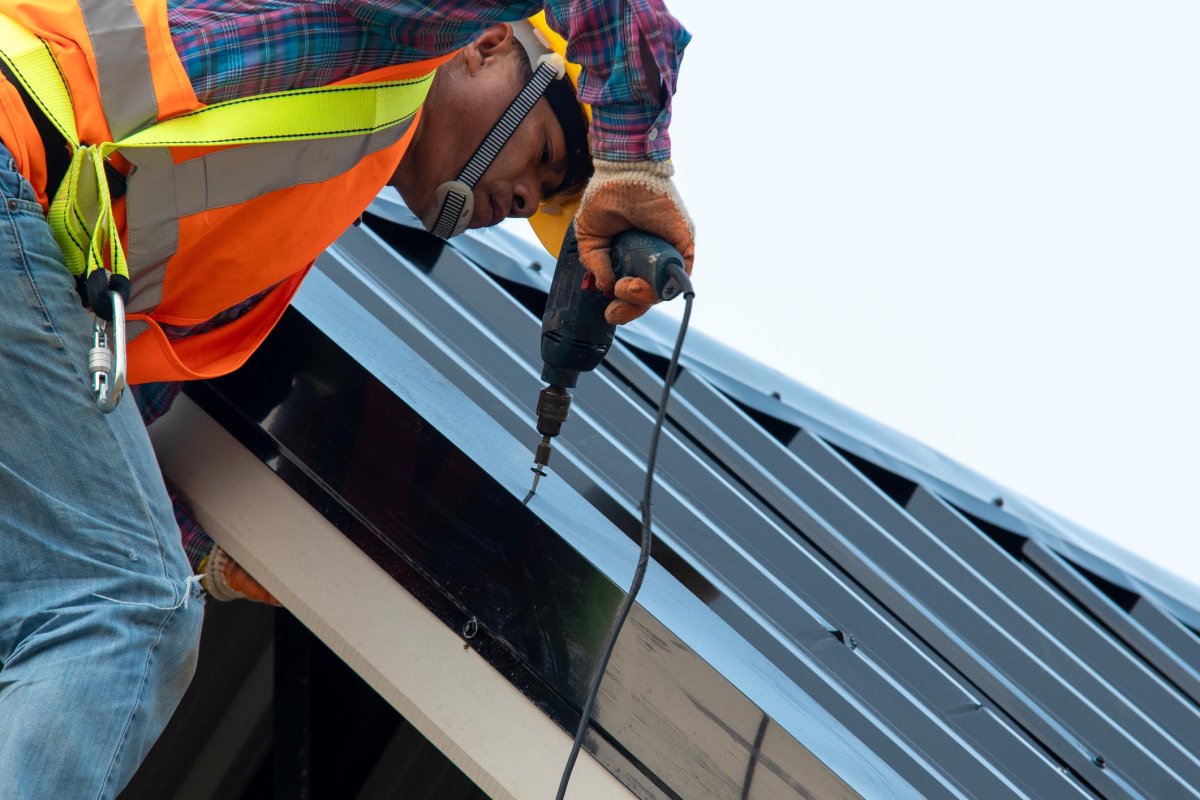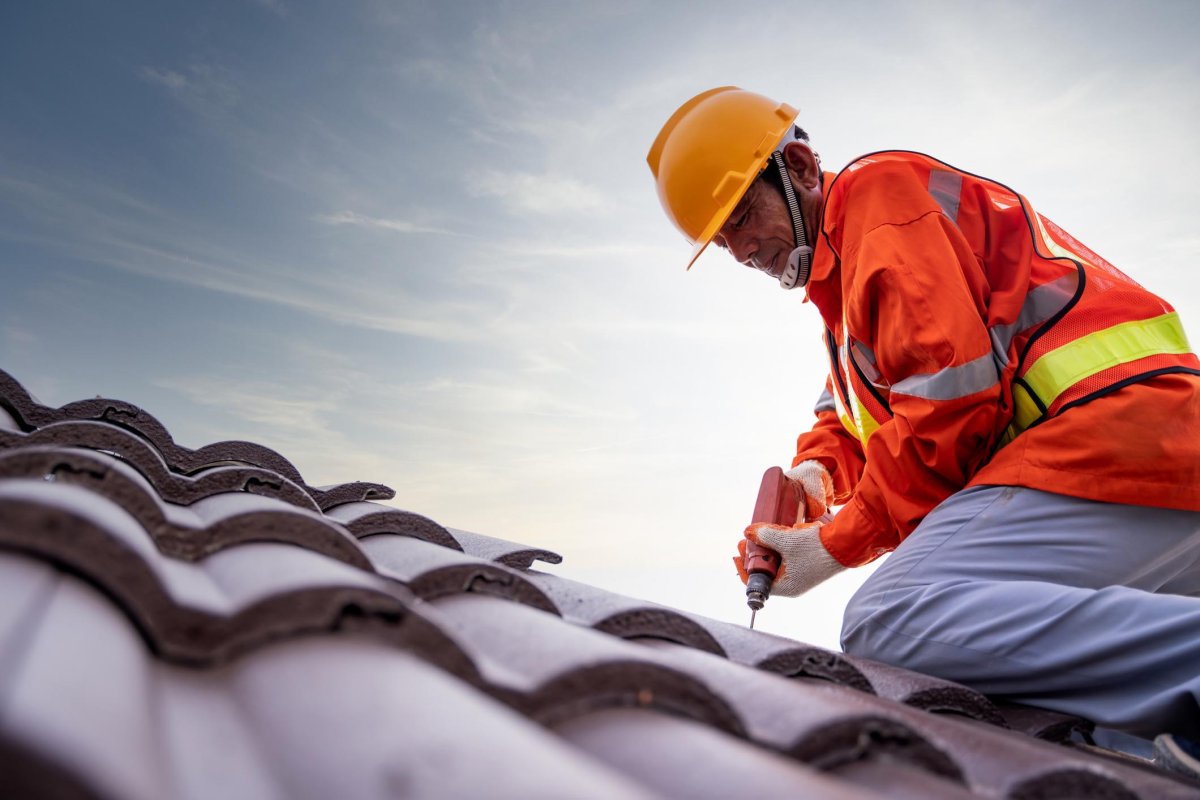We may earn revenue from the products available on this page and participate in affiliate programs. Learn More ›
What You Need to Know
- Storm chasing, which is when contractors go door-to-door after a storm to prey on vulnerable homeowners, is the most common roofing scam to be aware of.
- Other roofing scams use high-pressure sales tactics, low bids, exaggerated roof damage, large deposit requests, and even insurance fraud to cheat customers out of their money.
- You can avoid roofing scams by doing due diligence such as reading reviews, verifying licensing and insurance, resisting pressure tactics, getting multiple bids, and more.
- If you think you’ve been targeted by a dishonest roofing company, it’s important to report the incident to your local attorney general’s office, the Federal Trade Commission, or the Better Business Bureau.
Q: I’m looking to have some roof work done, but I’ve heard horror stories from friends and neighbors who have been taken advantage of by dishonest contractors. How do I know which roofing companies to avoid? Are there any roofing scam signs I can look out for to avoid getting ripped off?
A: Hiring the right roofer can be challenging under the best circumstances. However, knowing that bad roofing contractors are out there can make the process even more stressful. Many homeowners have heard of storm chasers, who go door-to-door soliciting roof work in areas impacted by severe weather. Once hired, these contractors may do shoddy work and leave town, and some may even take their clients’ deposits and fail to complete the job. Other dishonest roofers might pressure homeowners to sign a contract authorizing unnecessary repairs or even commit home insurance scams by filing inflated claims.
It’s worth noting that most roofers take pride in their work and aren’t looking to scam their customers. However, before hiring a contractor, it’s important to be prepared so you can separate the best roofing companies (such as Aspen Contracting and CMR Construction & Roofing) from the dishonest ones. It’s a good idea to get multiple estimates and verify the licensing and insurance of any contractors you’re considering before signing a contract.
7 Common Roofing Scams to Look Out For
While dishonest roofing contractors can be sneaky, they often follow familiar formulas. Before researching roofers in your area, it’s important to be familiar with some common scams so you’ll know the type of roofers to avoid.

Storm chasers prey on neighborhoods that have recently been subject to severe weather damage.
If you’ve ever noticed roofers knocking on doors and offering free roof inspections in your community, particularly after a storm or tornado, you’ve probably encountered storm chasers. Because damage in certain neighborhoods may be widespread, storm chasers often target these areas where they feel they can make the most money. This approach preys on homeowners who are already stressed and vulnerable.
For instance, one of the most common roof scams is for an unscrupulous contractor to offer a free roof inspection after a hailstorm. The contractor will then pressure the homeowner into signing a contract—or even worse, settling for a handshake agreement—before the homeowner has a chance to do due diligence on the contractor. Once hired, these contractors may do quick or sloppy repairs. In a worst-case scenario, they may even ask customers to make a large deposit, then leave town without doing any work at all. Because these contractors are always traveling from one community to the next, they don’t have to worry about poor online reviews or negative word-of-mouth.
Reputable roofers rarely go door-to-door, so it’s best to avoid hiring contractors who use this tactic. Companies that are established in the community also have an incentive to do honest work so they can stay in business. For an emergency such as a leaking roof, search for established local roofing repair companies that have good reviews.
Dishonest contractors may reel in customers with estimates that are too good to be true, and then increase the final price.
Beware of the bait-and-switch sales tactic. A disreputable contractor might lure in a homeowner with a cheap price for repairs. Then, once they’ve started the work, they’ll mention hidden damage they didn’t previously notice and increase the overall roof repair costs. They may also pressure a homeowner to agree to those repairs on the spot, claiming the repairs are urgent.
For those who aren’t sure how to pay for a new roof or are on a tight budget, it might feel as if low bids are too tempting to pass up. However, it’s vital to get several estimates from established local roofers before choosing one. A reputable contractor will provide a detailed breakdown of the work needed and the associated costs. They’ll also be able to explain the financing options available to help mitigate the initial cost of the work. You’ll want to avoid signing a contract on the same day, especially if the price seems too good to be true. It’s also worth asking the contractor about any possible unforeseen costs and how they will be handled before you agree to the work. Ideally, the contract will also outline how any cost increases will be handled.
High-pressure sales tactics are sometimes used to solicit a contract agreement from customers before they can do due diligence on the roofing company.
Dishonest roofing contractors may use forceful tactics to pressure homeowners into signing a contract before homeowners have had a chance to research the contractor properly. It’s helpful to know the most common red flags.
- Urgency. A contractor might insist the repairs are critical and need immediate attention, pressing homeowners to sign on the dotted line before getting other quotes.
- Limited time offers. Unethical contractors may dangle a “special discount” or “free extras” if a homeowner signs today only. This is a ploy to rush a homeowner into a decision.
- Vague contracts. A shady contractor might present a contract with unclear terms or extremely high cancellation fees.
A reputable roofer will be happy to answer any questions and give homeowners time to consider their options. It’s important to take the time to research companies you’re considering and get multiple quotes for roof repair or roof replacement costs so you’re confident in the professional you ultimately choose.

Some companies may exaggerate or invent roof damage to garner business from unsuspecting homeowners.
Not all roof damage is created equal, and dishonest roofers may exaggerate or even invent roof problems to convince a homeowner they need roof repair. Companies may downplay their sales pitch and insist they’re just offering a free inspection. This can be a ploy to fabricate problems (or in extreme cases, damage the roof themselves) to justify unnecessary repairs.
Contractors employing roof inspection scams use general terms like “extensive damage” or “roof failure” and recommend roof repair or replacement without providing clear details. If possible, it may be worth taking photos of the roof before the inspection. This way, you can compare those images to the contractor’s findings and see if anything doesn’t line up. A trustworthy roofer will clearly explain the specific problem, its location, and how it affects the roof’s functionality. Generally speaking, the potential to save on roof inspection costs isn’t worth the risk of hiring a shady roofer.
Insurance fraud is a sneaky—and illegal—practice in which roofing contractors offer to “assist” customers with their deductibles.
Insurance fraud is a serious crime and can land homeowners in hot water. If it’s expected that homeowners insurance will cover the roof work, the roofer may offer to “help” their client file the claim. The roofer will then offer to pay the homeowner’s deductible. They’ll then inflate the repair costs on the claim they submit to the insurance company, pocketing the difference. This can backfire in a few ways. For one, an insurance company may hike the homeowner’s insurance rates if fraud is suspected. It can also deny the entire claim if it discovers any misrepresentation of the damages. In the worst-case scenario, the homeowner could face legal repercussions. It’s worth noting that if the homeowner has a home warranty, a similar home warranty scam could also be committed.
The best homeowners insurance companies (such as Allstate or Lemonade) are there to help. You’ll want to work directly with your roofing insurance provider to ensure a smooth claims process and avoid getting tangled up in roof insurance scams. If submitting a claim, you don’t want to miss crucial steps—or your insurance provider can deny it.
Some fraudulent roofing contractors will ask for a large deposit up front, then disappear before doing any work.
While being asked to pay a deposit for roof work is standard, customers will want to be wary of paying huge deposits, especially before a contract has been signed. Dishonest roofers might pressure clients into paying a large deposit up front, often with scare tactics about securing materials or scheduling the job. They will then take the money and vanish, leaving the homeowner with a damaged roof and an empty wallet.
Reputable roofers typically request a smaller deposit, such as 15 percent or less of the total job cost, to cover materials such as the best roofing shingles. Another red flag of a dishonest roofer is accepting only cash. It’s a good idea for homeowners to pay with a check or credit card that can be traced, which provides additional protection. Finally, having a written contract outlining the payment schedule, including the deposit amount and due dates, is a nonnegotiable. This protects the homeowner and ensures the roofer completes the job before receiving full payment.

Finally, sketchy roofers may charge sky-high prices for low-quality materials to increase profit margins.
The average homeowner may not be able to tell the difference between the best roof underlayments or shingles and a cheap alternative. Some roofers might take advantage of this by charging for high-end materials but purchasing flimsy ones at a lower cost. This allows the roofer to pocket the difference, leaving the customer with a roof that won’t last as long and may not perform as well.
It’s important to ask your prospective roofer about the materials they plan to use. Reputable roofers will readily discuss specific materials and explain the benefits of each option. It’s also a good idea to look up the average cost for roofing materials in the area to get a sense of fair pricing. Some roofers may push for unnecessary upgrades on materials, so you’ll want to trust your instincts and stick with what’s required for the roof repair.
How to Vet a Roofing Company Before Hiring
For homeowners who are worried about roofing scams, it’s worth doing some research before committing to a roofing company. Start checking whether a roofing company is legit by asking friends and neighbors if they are familiar with the company, but don’t stop there.
- Be skeptical of salespeople. Trustworthy roofers rarely solicit business by going door-to-door. Instead, homeowners will want to contact local companies that are well established in the community.
- Get multiple estimates. It’s vital not to be swayed by the first offer, especially if it seems too good to be true. Get estimates from at least three established roofing companies to compare prices and services.
- Verify licensing and insurance. Make sure the roofer you’re considering has the proper licenses and insurance to operate in the area. Don’t hesitate to ask for proof, and be sure to check their references.
- Beware of pressure tactics. Ruthless contractors may use scare tactics or a high-pressure sales technique to rush homeowners into a decision. Don’t be pressured to sign a contract on the same day. Homeowners will want to take their time, ask questions, and be sure they’re comfortable with the roofing company.
- Review the contract carefully. A detailed contract will outline the scope of work, materials used, payment schedule, and warranty terms. Avoid signing anything if it’s not clear.
- Collect information. It’s always wise to get (and verify) a roofer’s contact information including the business name, address, email, and phone number. If the roofer disappears with the deposit, the homeowner will have a paper trail to be able to file a police report.
- Ask for recommendations. Ask friends, neighbors, or local contractors for referrals. Positive word-of-mouth is a strong indicator of a company’s quality and reputation.
- Look for established businesses. Companies with a long history in the area are less likely to be dishonest. Check online reviews and the Better Business Bureau (BBB) for a contractor’s track record. Established roofing companies typically use high-quality products, including the best roof sealants.
- Verify online presence. A legitimate company will have a professional website that details its services, certifications, and contact information. Be wary of contractors with a limited online presence or negative reviews.
If you suspect a roofing scam, don’t hesitate to report it. One helpful resource is the state’s attorney general’s office, which investigates consumer complaints about home improvement scams. You can also file a report with the Federal Trade Commission (FTC) or the BBB.


